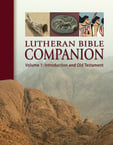When Zechariah was prophesying, the people of Judah were standing amidst the destruction of their once glorious city. With no city and no temple, the people of Judah had no hope; they feared that God had left them. God worked through Zechariah to restore faith in His people. The following has been adapted from Lutheran Bible Companion.
Purpose
In the face of the disillusioning realities of continuing foreign rule, economic
uncertainty, and internal apathy, Zechariah sustained the faith of the congregation in the divine promises. By his concentration on the temple—and
the theology of purification or sanctification accompanying it—Zechariah
played a major role, under God, in the preservation of Israel until the new
kingdom dawned with Christ.
Characters
Joshua, the high priest, is on trial and is clad in “filthy garments” as a visible sign of his sin (Zec 3:3; cf Job 9:31). The prosecuting attorney is “the Satan,” as in Job 1–2 (“Satan” is not used as a proper noun, as we meet it a century later for the first time in 1Ch 21:1). But plainly it is not so much the high priest who is being personally charged. The high priest served as mediator and representative of the whole congregation (“Israel reduced to one,” as is sometimes also said of prophets and kings).
By God’s favor, Joshua will be clad in “pure vestments” (Zec 3:4; that is, Jerusalem’s future purity and glory, her “righteousness” in the Messiah’s kingdom, in contrast to her present humiliation and sin).
The enigmatic figure of Zerubbabel plays a somewhat less central role in Zechariah than in Haggai.
Summary Commentary
Zechariah 1:1–6
When God’s Word produces changes of heart and life, it bears beautiful fruit. The people of Judah have to learn that lesson from their tragic past lest their return from exile end in sorrow. When God’s Word meets resistance and rejection, then there will be a repeat of the same shuddering outcome seen in war-damaged Jerusalem.
Zechariah 1:7–6:8
The prophet next records a series of eight visions. At a moment
when God seems remote and uncaring, Zechariah sees that He is guiding
events for good. The Angel of the Lord is among His people, interceding
for them and preparing for the rebuilding of the temple and city. However,
Zechariah’s soul wilts before the forces arrayed against the holy people from
his own day to the end of time. Almighty God stiffens the prophet’s backbone and restores his courage by the sight of even mightier powers fighting
on the side of God’s people. He sees that a measuring line will not do when
seeking to determine the extent of God’s kingdom (2:1–13). His promise to
dwell in Jerusalem’s earthly temple pales in splendor to what is to come.
God used earthly leaders like Joshua and Zerubbabel to accomplish His work in this world (4:1–14). Rebuilding the temple was a most important project for the Jerusalem community of believers, many of whom had returned from exile in Babylon. Nevertheless, the ever-present temptation to idolatry came to the people of Jerusalem who had worked so hard at rebuilding the temple (5:5–11). God made it clear that idolatry had no place among them; that wicked woman had to be carted off to Babylon. In the last of the eight visions (6:1–8), the Lord reveals to the people of Jerusalem, who have suffered devastation, that He is indeed powerful and active. His authority is likened to strong horses pulling four chariots, patrolling the earth in all directions.
Zechariah 6:9–15
In the midst of the book, a crown made from gifts of gold and silver becomes an object lesson to teach about the coming Branch, who will fill the offices of King and Priest. Not everyone in Zechariah’s day wholeheartedly believes God’s promises that accompany this lesson.
Zechariah 7–8
In the last dated section of Zechariah’s prophecies, priest and people alike need to learn the lessons from Judah’s history lest the errors that caused such distress be repeated. In a series of seven oracles (8:1–17), the Lord of hosts contrasts His future blessings with the judgment His people had suffered in former days. God then tells the people of Bethel that their fasts will become joyful worship. He promises a great movement of people from the Gentile world who will seek the Lord and entreat His favor.
Zechariah 9–14
The final section of the book describes the Messiah and His kingdom. The Lord’s saving work on behalf of His people is foretold using illustrations based on Old Testament history. God’s enemies suffer defeat for breaking His Holy Law. Chapter 11 begins with a lament over the Lord’s coming judgment, followed by a description of how He abandoned His flock and no longer had pity on them. This chastisement is God’s “strange” work. His “proper” work is to comfort. The day is coming, declares the Lord, when His people, represented here by Jerusalem and Judah, will be delivered from their enemies (12:1–9). Zechariah concludes by prophesying intense mourning for all people until the messianic kingdom is fulfilled.
Martin Luther on Zechariah
He is truly one of the most comforting of the prophets. He presents many lovely and reassuring visions, and gives many sweet and kindly words, in order to encourage and strengthen the troubled and scattered people to proceed with the building and the government despite the great and varied resistance which they had till then encountered.
(From The Lutheran Study Bible, p. 1523.)
 To learn more about Zechariah, read Lutheran Bible Companion.
To learn more about Zechariah, read Lutheran Bible Companion.
























